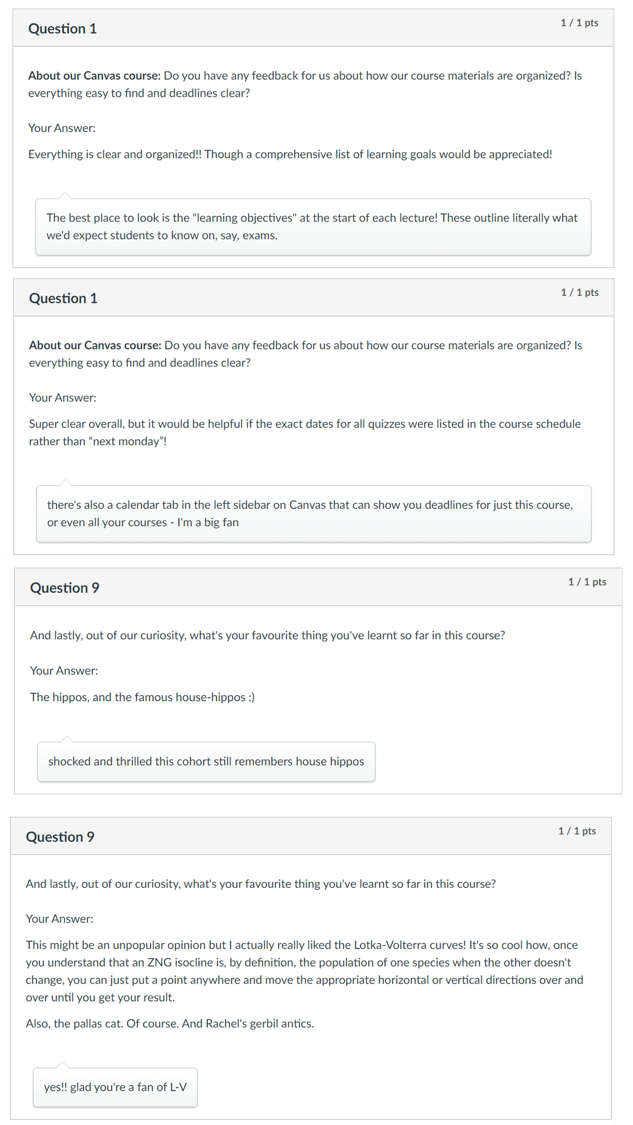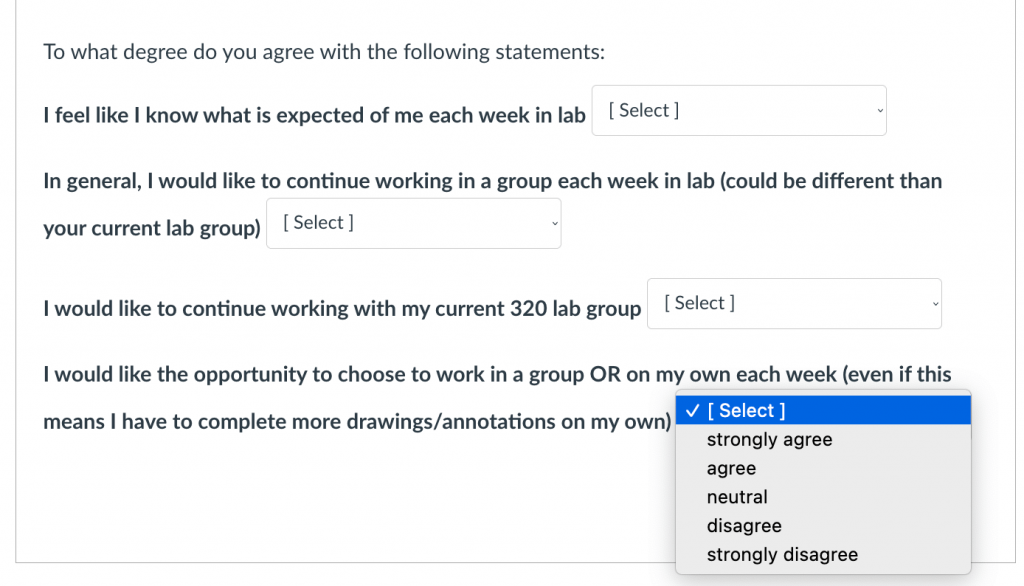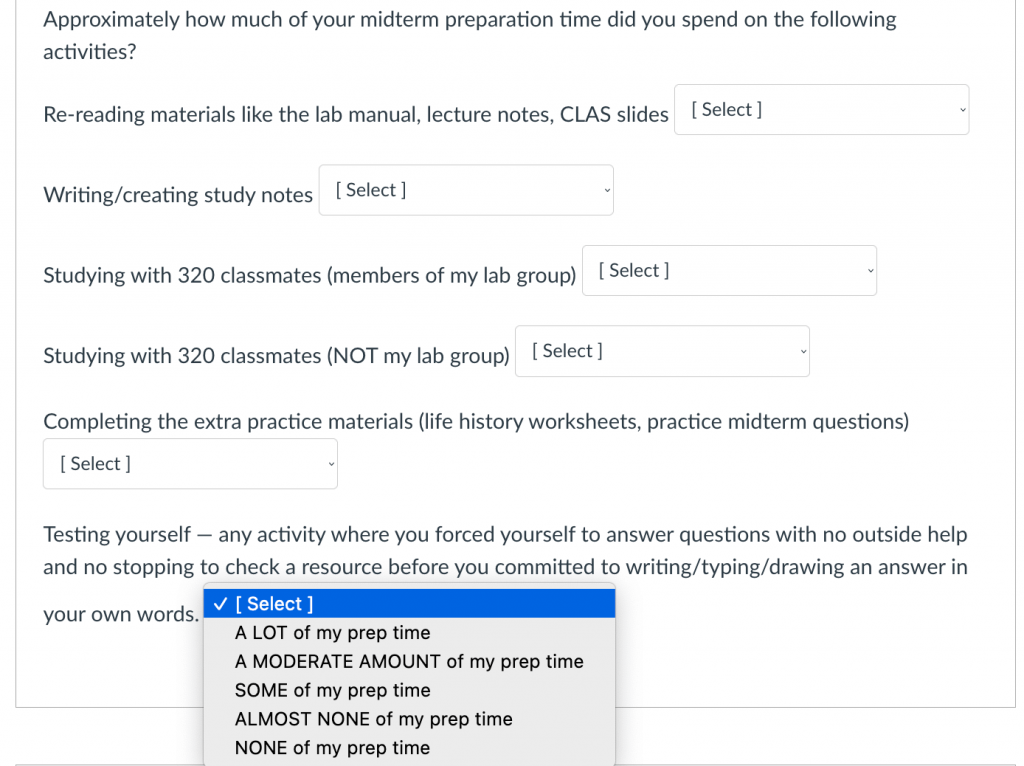
The midpoint of a course is a great time to ask students for feedback – students now have enough experience in the course to provide meaningful feedback, and there’s still time in the term to respond to the feedback they provide.
Below, Rachel Germain, Bridgette Clarkston, and Jaclyn Dee share their experiences with doing mid-course student feedback in their courses. Keep reading to learn why and how they ask students for feedback, the impact it has made, and what they’ve learned along the way.
Rachel Germain (BIOL 230; BIOL 404)
What was your motivation for asking students for mid-course feedback?
I felt like it was a nice way to hear from students about what was working well or not well and make adjustments. I think this is important to build connection and trust with students, as they can see the changes I make based on their feedback: I give them a list of major feedback and what changes I am making, and also a list of things students said they liked.
It is also an opportunity for me to let them know why certain things are set up the way they are or resolve misunderstandings, so they know there’s reasoning behind it. Since I collect feedback as a Canvas survey, I can respond to individual students in the Comments section about anything they’ve mentioned, forming more of a personal connection even in a large class.
How did you go about asking students for mid-course feedback?
They can get participation marks for filling out course feedback – they get many reminders in class, so these should act as free marks. Students are asked to respond to the following questions in a Canvas survey:
-
- About our Canvas course: Do you have any feedback for us about how our course materials are organized? Is everything easy to find and deadlines clear?
- About the lectures: What about them do you like that we should keep doing?
- About the lectures: What suggestions do you have for us to change to improve your learning?
- About the labs: What suggestions do you have for us to change to improve your learning?
- About the labs: Have you attended TA office hours for help with the labs? If yes, were you able to get help with your questions?
- About the labs: What’s your preferred way to get help with labs?
- Piazza
- Office hours
- Peers (e.g. group chats)
- Email TA or instructor
- N/A – I haven’t needed help yet
- About you: What could you as a student do differently to improve your learning in this course? For example, have you been keeping up with the lecture materials? Keeping track of deadlines?
- We asked you this at the beginning of the semester, but are curious if anything has changed. On a scale or 0 to 5 (0 being lowest), how interested are you in ecology as of right now?
- And lastly, out of our curiosity, what’s your favourite thing you’ve learnt so far in this course?
Here are some examples of student responses, along with my comments:

How did students respond?
Students have mentioned that I listen to them and care about their learning, which could be tied in part to the feedback.
Is there anything else you’d like to share?
I also asked students in the feedback to reflect on what they could do differently or continue doing to support their own learning, because it’s a two way street. 🙂
Bridgette Clarkston (BIOL 121; BIOL 209; BIOL 320)
What is your motivation for asking students for mid-course feedback?
I primarily teach large first, second and third year courses, with between 60-250+ students per course. In my experience, even in a “smaller” group of 50 or so students, most don’t speak up in class. I want to know how all of my students are doing, not just how they perform on formative and summative assessments, and so I try to use at least a couple of small reflection assignments or a mid-semester check-in surveys for each course.
How do you go about asking students for mid-course feedback?
I have asked students for mid-course feedback in a variety of ways over the past few years. Some examples are: on paper directly following a midterm, via a series of iClicker questions during class, and posting a feedback survey on Canvas for students to complete out of class.
What has been the result?
For me as the instructor, the result of a mid-course check-in (large or small, in-class or out, paper or digital) has been to gain incredibly valuable insight into how students are perceiving and experiencing the course. Whatever mode of check-in I do, I try to take a few moments in class to discuss the results in aggregate. What are students still wondering about following the recent lab on X organismal group? Were students feeling prepared for their latest midterm and did they receive a score similar to what they expected? How did they prepare for a recent assessment? Are students generally experiencing the pace of the course as too fast, too slow or just right? What instructional practices, resources, or anything else under my control are students perceiving as helpful for their learning? What tech issues or other barriers to learning are students generally facing? Note: I don’t pack all of these topics into a single check-in, these are some examples of topics I’ve covered in different check-ins.
What impact has this had on students?
When I ask a general mid-course check-in, often there are common requests for changes that I can make and some that I can’t. I talk about both and lay out what I can and cannot accommodate. My anecdotal impression of how students are impacted by these check-ins, which students will comment on in my end-of-course evaluations or tell me directly, is that they feel heard, even if I can’t (or sometimes won’t) make a commonly-requested change. Like responding to emails faster. I absolutely will never be fast enough with my email responses. I think a key part of making the students feel heard is to have that brief discussion in class of their survey responses. Doesn’t have to take more than a few minutes, but it seems to make an impression.
How have students responded?
Well, in terms of response rate, most if not all of my students complete a mid-course check-in survey. I had 98% of 213 students respond to my last Biol 121 mid-course survey that took about 15 minutes of time outside of class to complete. This high response rate is almost certainly because I gave participation credit, which amounted to roughly 0.5% of their overall course, and I did this one time during the course. Below I’m pasting the language I use to explain to students that the survey is not anonymous and what the trade-off is in having a feedback survey be identifiable. I would actually love to discuss this topic more broadly with UBC peers. I think students at UBC, and perhaps across undergraduate institutions more broadly, are asked to do too many surveys. When I ask students to do a survey that takes more than 5 minutes, I do believe they should be given some credit for this effort and class participation is the best solution that I’ve experienced up to this point. Here’s how I introduce these surveys: “The survey should take roughly 10-15 minutes and is not anonymous. I do this so we can give you credit for this feedback towards your in-class participation grade — I know these surveys take valuable time out of your day and I want to acknowledge that effort. The trade-off is that your name is attached to your survey and you may feel unable to provide honest answers. I want to reassure you that constructive criticism about the course is welcome and valued. You will receive the same credit for any thoughtful responses, critical or otherwise.”
What have you learned?
I’ve learned many things from doing these surveys. One very positive and general thing is how uplifting it is for me as the instructor to hear from the majority of students what they perceive as helpful for their learning while the course is in progress. I often hit a wall of exhaustion mid-way through each semester. Sometimes I wonder if all the effort I’m putting in to this or that element of the course is actually worth it. To find out what students enjoy (or not) is a real pick-me-up that I often greatly appreciate towards the end of the semester.
What advice would you give someone who might want to try this in their own course?
100% I would recommend doing a mid-course survey in a digital format and, if possible, have some questions that are not open-ended so they can be easily summarized. Just as my eyes are always too big for my stomach at a restaurant, if left unchecked, my survey design will give me a mountain of open-ended written responses that I will NEVER summarize in time to be useful for either me or the students that semester.
Is there anything else you’d like to share?
Below I’m sharing a couple of screenshots from Canvas check-in surveys I have recently done using a combination of short-answer questions (e.g., “What has been most challenging for your learning in the Biol 320 lab so far?”) and multiple-choice questions asking students “To what degree do you agree with the following statements….”. I really, really like these statement-agreement questions, or statement questions with multiple-choice responses, because they are summarized directly in canvas and, at least in my experience, can quickly give insight into many specific aspects of the course.


Jaclyn Dee (BIOL 112; BIOL 209)
What is your motivation for asking students for mid-course feedback?
I am always curious about how things are going for the students and if there is something I could be doing better in my classes. Grades aren’t that informative in many regards. I want to know if there are certain types of activities that I’m doing that the students appreciate or practices that are hindering their learning. I want to know if there is something that would be simple for me to change that would make their experience much more positive. Finally, I know that I have the tendency to obsess over certain details that ultimately don’t matter, but I neglect the things that make a difference for students and having the students remind me of that keeps me from going off the rails.
How do you go about asking students for mid-course feedback?
I’ve done a couple of different things. I’ve tried the STOP-KEEP-CHANGE method – just asking students to name one thing that I should stop doing, one thing that I should keep doing, or one thing that I should modify. I’ve also asked more pointed questions such as “What types of activities in this course are helping you learn?” or “What is one question you have right now for me?”. Both approaches seem to be equally informative.
In terms of techniques for gathering this information, I’ve handed out index cards, blank sheets of paper that they fold into four, created a Qualtrics survey, and had students fill out a Padlet anonymously. What is key is that I do it during class. I want feedback from everyone! Unless you give them time in class, you won’t get the same level of participation. I guess I could also give them a survey outside of class for bonus credit, but I want them to feel like this is an ‘official’ ask and that they have an official say in how the course is run and doing this feedback exercise in class aligns better with that message.
What has been the result?
I typically read the feedback and summarize the major findings for the class. I tell them what I can change and what I can’t/won’t change and why. I make sure that I make those changes. Honestly, it’s hard to tell if the changes have directly made an impact on their learning, but I’ve had some students comment that they feel like they are being heard and they appreciate that.
What have you learned or found surprising?
Take the feedback seriously, but with a generous grain of salt. Some feedback is great and easy to act on, for example, I was asked to include summary slides and that was nice addition. However, I’ve found that feedback like, “I want more practice questions”, is a real bear. You can try to make a few more questions or include challenge questions on worksheets, but ultimately, you can make hundreds of practice questions and many students still won’t be satisfied. One useful tip I’ve gotten from experienced colleagues is to invite them to make their own questions based on the learning objectives and study with friends. On that note, in many cases, bringing those difficult comments to colleagues and asking for their advice has been highly effective for building my repertoire of teaching approaches. Lastly, there are some comments that I think you need to just let slide because of contradictions between student comments or because they might not be under our control.
What advice would you give someone who might want to try this in their own course?
Share the feedback experience with someone else. Talking to other people about the feedback you’ve received is helpful in prioritizing what actually matters and may enable you to find solutions to problems that both of you have. Also, we can be too critical of ourselves and having another person put things into perspective is a relief. If you’re anxious about reading your own feedback, ask a trusted friend/colleague to read it and summarize it for you. You can offer to do the same for them. Sometimes comments are too personal or just feel too personal and feedback is more constructive when someone who cares about student learning and about you has partially digested the feedback and has framed it in a constructive way.